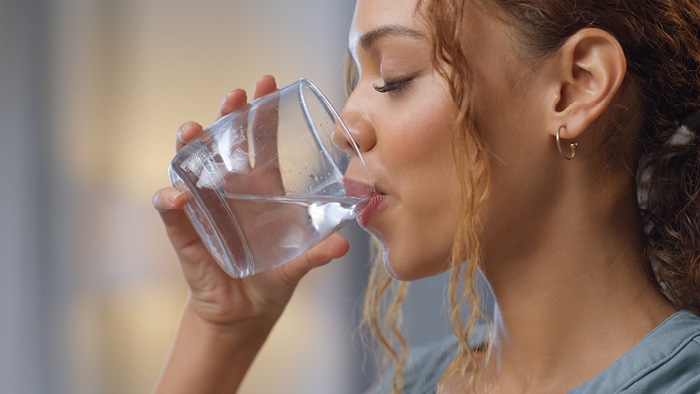Water: Your everyday energy drink
July 20, 2023
As we head into the middle of summer, HSHS St. Joseph’s Hospitals in Breese and Highland and HSHS Holy Family in Greenville want to remind everyone of the importance of staying well-hydrated.
Kayla Barnes, RD, LD, registered licensed dietitian for both St. Joseph’s Hospitals and Holy Family Hospital, said, "Water is a vital nutrient that all people need to survive. It helps maintain physical health and mental acuity, as well as overall appearance. Drinking enough water daily can have a positive effect on your life."
Benefits of drinking water
About 60% of the body is made up of water. It regulates body temperature, lubricates and cushions joints and protects organs. Cells need water to transport nutrients. Wastes and toxins are flushed out through sweat, urine and bowel movements—all of which require water.
Drinking enough water can also affect mental health. Being well-hydrated provides what a person needs to stay alert, focused and productive throughout their day. All of this is why it's so important to replace the fluids lost during activities.
Are you dehydrated?
Dehydration occurs when a person loses more fluids than they take in. Be sure to increase your fluid intake in hot weather, when you increase your physical activity and when you are sick (especially with vomiting, diarrhea or fever). Additionally, drinking alcohol and caffeinated drinks can also cause you to lose water.
Some common signs of dehydration include:
- Extreme thirst.
- Dry or sticky mouth.
- Less sweat than usual.
- Dark-colored urine or no urine at all.
- Dry skin.
- Digestive problems.
- Headaches or dizziness.
The good news is that symptoms often go away when you rehydrate.<
Choose water
Many people reach for beverage options like sports drinks to hydrate during or after high-intensity exercise or activities with their added carbohydrates, minerals and electrolytes. Other popular drinks are regular soda, fruit drinks and energy drinks. However, these also contain sugar, calories or caffeine.
Sugary drinks are the leading source of added sugars in the American diet. People who often drink sugary drinks are more likely to face health problems, such as weight gain, obesity, type 2 diabetes, heart disease, cavities, and gout, a type of arthritis.
Barnes shared, "Try reading the nutrition labels on the drinks you are putting in your shopping cart – you might be surprised to see how many added sugars are in some of your choices. Water is a healthy alternative to sugary beverages –100% natural and calorie-free."
For example, a 12-ounce regular soda has more than 10 teaspoons of added sugar, adding up to 150 calories. Consuming two sodas a day adds up to 2,100 calories in a week.
Barnes recommends the following simple steps to increase your water intake without the added sugar:
- Carry a refillable water bottle with you. Set reminders on your phone if you need a nudge to drink throughout the day.
- Choose water when eating out. It saves both money and calories.
- Drink a glass of water before you consume your meal. Besides helping with hydration, it will help you feel fuller so you will eat less.
- Mix up your water options. Try adding fruit slices, like pineapple, watermelon or lemon, or vegetables and herbs, like cucumber or mint. Make flavored ice cubes with 100% fruit juice, unsweetened tea or chopped fruit. Choose seltzer or sparkling water over juices and sugary beverages.>
- Don’t forget fluids are in many foods too. Eating water-rich fruits and vegetables, such as melons and tomatoes, can help you stay hydrated.
Water is often overlooked as a key element to overall health. Just taking a few simple steps can help you stay hydrated and healthy. If you suspect significant dehydration, seek medical attention immediately.
